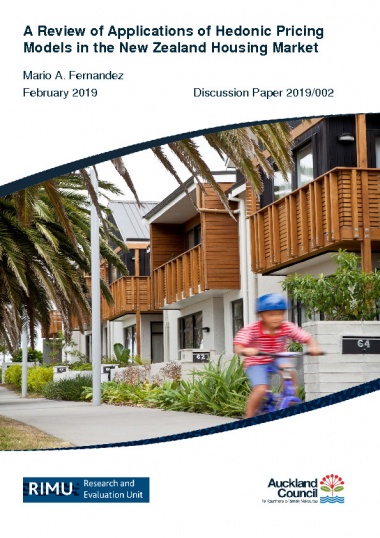A review of applications of hedonic pricing models in the New Zealand housing market
Author:
Mario Andres FernandezSource:
Auckland Council Research and Evaluation Unit, RIMUPublication date:
2019Topics:
HousingNew Zealand is a spatially unique landscape where urban and environmental amenities shape the urban configuration of each city and determine land-use regulations. Hedonic pricing models supply information to make appropriate decisions regarding the provision of those amenities and to design more effective zoning and land-use regulations. Those models contribute to informing planners on how individuals value amenities and developers on how to design development projects that preserve profit-maximization behaviour (Heal, 2001; Anderson and West, 2006). Planners and policymakers may use those models to inform the ongoing discussions about the direction and typology of growth that is sought for any city.
Hedonic models use data on housing market transactions to determine the implicit price of housing attributes. Essentially, hedonic models analyse the price differential between two houses that vary only by one characteristic and the monetary trade-offs individuals are willing to make with respect to the changes in that characteristic. These models have been extensively applied to housing markets in New Zealand in order to explain the variations in housing prices as a reflection of the value of housing attributes (e.g. number of bedrooms, land area). The attributes that have received the most interest are environmental and urban amenities.
Research using hedonic models in New Zealand is largely applied and focused in the major cities (Auckland, Christchurch and Wellington). For the case of Auckland, research has addressed the valuation of environmental amenities (water views and parks), urban amenities (schools), housing and household features, policy (school zones, zoning), and market behaviour.
This paper is a literature review of applications of hedonic models in New Zealand and describes three current studies led by staff of Auckland Council. This paper then summarises empirical applications in terms of their research questions, methods and data, and contributions. Researchers and policymakers will find this paper useful to locate their own work within the context of existing literature.
Auckland Council discussion paper DP2019/002, February 2019
